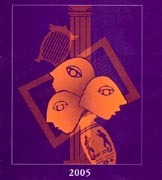
Put a group of educators in a room together, and what do you get?p. Lots of discussion and an enriching experience, says Darcia Narvaez, associate professor of psychology, who last month taught aseminar for elementary through high school teachers through Notre Dame’s professional development program “Teachers as Scholars” (TAS).p. Her topic,Nurturing Ethical Character during Academic Instruction,provided her teacher-students with a research-based framework for teaching good character.p. Narvaez, herself a former primary and secondary schoolteacher, enjoyed the lively classroom discussion.They are wise,she noted.If I give a topic for discussion in a class of undergraduates, they might finish in five minutes. Here they could talk all morning.p. Discussion is the goal of TAS, which provides K-12 teachers the chance to become students again. Meeting on campus, the program allows participants to study and reflect upon scholarly issues in full-day seminars taught by leading College of Arts and Letters faculty. Participating teachers are encouraged to select a seminar on the basis of their interests, regardless of the grade level or subject they teach. The seminar often steps away from classroom strategies, and aims, instead, to refresh a teacher’s love of learning.p. Topics this year ranged fromUnderstanding Sub-Saharan Africawith political scientist Peter Walshe, toStudying Human Remainswith anthropologist Susan Guise Sheridan, toThe Crusadeswith Thomas Noble, Robert Conway Director of the Medieval Institute. Eight topics are offered each fall and spring semester, and about 200 area teachers participate.p. Framing a seminar for adult students allows the Notre Dame faculty an opportunity for creative experimentation. Thomas Slaughter, Tackes Professor of History, for example, will partner with a local chef to serve a Jeffersonian meal next spring when he teachesDining with Jefferson.Slaughter said the idea came to him in light of a famous quip by President Kennedy, who noted at a dinner party for American Nobel laureates thatthere had not been so much intellect at a White House meal since Thomas Jefferson ate there alone.p. Faculty presenters enjoy meeting with older, experienced professionals and dealing with a topic in depth, said E. Jane Doering, TAS executive coordinator.Weve had 60 professors, and theyve all been delighted with the experience,she said.It is a chance to reach another audience, and to think about how they profess what they profess.p. Faculty presenters are recommended through the office of the dean and invited to present a topic they think will engage the teachers.p. The opportunity to interact with educators who influence young people attracted Asma Afsaruddin to lead a seminar. She is an associate professor of Classics and a fellow in the Kroc Institute for International Peace Studies. She recently presented a seminar, “Struggling in the Path of God: Perspectives on Jihad in Islam.”p. Teachers are a crucial conduit for making our expertise available to a larger population where it can have the most impact,she said,especially in correcting misconceptions or sloppy conceptions regarding emotive issues like jihad.p. Sheridanhas taught four TAS sessions.It was initially a bit daunting to teach teachers,she said,but their curiosity, originality and genuine interest made for a truly enjoyable experience. Their enthusiasm was contagious.p. TAS was brought to Notre Dame in 2000 by Julia Douthwaite, then associate dean of Arts and Letters, and Theodore Cachey, professor of Romance languages and literature. It was funded initially by a grant from the Woodrow Wilson National Fellowship Foundation.p. The Woodrow Wilson Foundation emphasizes the sharing of a universitys intellectual riches with the community,says Doering.Notre Dame is anxious to contribute beyond its walls. It is a way of giving back, saying thank-you to teachers in our community for educating our children.p. TAS receives support from the U.S. Institute for Peace; Notre Dames College of Arts and Letters, Nanovic Institute for European Studies, Medieval Institute, and Devers Program in Dante Studies; and participating local school districts.
TopicID: 7802